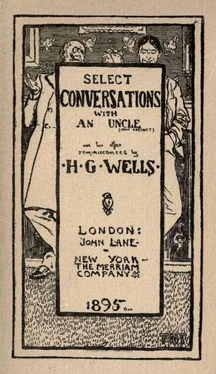Herbert Wells - Select Conversations with an Uncle (Now Extinct) / And Two Other Reminiscences
Здесь есть возможность читать онлайн «Herbert Wells - Select Conversations with an Uncle (Now Extinct) / And Two Other Reminiscences» весь текст электронной книги совершенно бесплатно (целиком полную версию без сокращений). В некоторых случаях можно слушать аудио, скачать через торрент в формате fb2 и присутствует краткое содержание. Жанр: Классическая проза, на английском языке. Описание произведения, (предисловие) а так же отзывы посетителей доступны на портале библиотеки ЛибКат.
- Название:Select Conversations with an Uncle (Now Extinct) / And Two Other Reminiscences
- Автор:
- Жанр:
- Год:неизвестен
- ISBN:нет данных
- Рейтинг книги:4 / 5. Голосов: 1
-
Избранное:Добавить в избранное
- Отзывы:
-
Ваша оценка:
- 80
- 1
- 2
- 3
- 4
- 5
Select Conversations with an Uncle (Now Extinct) / And Two Other Reminiscences: краткое содержание, описание и аннотация
Предлагаем к чтению аннотацию, описание, краткое содержание или предисловие (зависит от того, что написал сам автор книги «Select Conversations with an Uncle (Now Extinct) / And Two Other Reminiscences»). Если вы не нашли необходимую информацию о книге — напишите в комментариях, мы постараемся отыскать её.
Select Conversations with an Uncle (Now Extinct) / And Two Other Reminiscences — читать онлайн бесплатно полную книгу (весь текст) целиком
Ниже представлен текст книги, разбитый по страницам. Система сохранения места последней прочитанной страницы, позволяет с удобством читать онлайн бесплатно книгу «Select Conversations with an Uncle (Now Extinct) / And Two Other Reminiscences», без необходимости каждый раз заново искать на чём Вы остановились. Поставьте закладку, и сможете в любой момент перейти на страницу, на которой закончили чтение.
Интервал:
Закладка:
"Listen!— Tum Tum Ti-ti-tum —No!— tum . Slight pause. Tum tum twiddle —vigorous crescendo—TUM. This is unusual! A stranger? A new piece for La Belle Dame Sans Merci? Her wonted reckless dash deserts her. She is, as it were, exploring a new region, and advances with mischievous coyness, with an affectation of a faltering heart, with hesitating steps. My imagination is stimulated by these dripping notes. I see her, as it were, on an uneven pavement; here the flags are set on end, there fungi have tilted them, a sharp turning of the page may reveal heaven knows what horrors; presently comes a black gap with a vault of dusty silence below. A pause, an incoherency, a repetition! She has encountered some difficulty, some slumbering coil of sharps and flats, and it raises its bristling front in her way.... She has fled back to the opening again. I begin to wonder what unhappy musician lies hidden in this new ruin, behind the bars of this melancholy confusion. There is something familiar but elusive, like a face that one has known and loved and lost and met again after the cruel changes of intervening years. It conjures up oddly enough a vision of a long room in the twilight, and an acacia in silhouette against the pale gold of the western sky. Ah! now I know!
" That of all pieces!
"I must have my walk, George. I cannot bear to hear that old-familiar music so evilly entreated. But, all the same, the memory it has touched will vibrate and smart; to-day and to-morrow, and I know not for how many days, it will re-echo in my brain. All the old cloudy remorse that has subsided will be set astir again. I shall hear again a light touch upon the keys, see again the shadowy face against the sunset, try to recall the sound of a voice.... What evil spirit has put this mockery into the head of La Belle Dame? Surely without this——"
He made a dive at the folding doors and presently reappeared in his coat. It was the only intimation I ever had that my dear little uncle had such a thing as a Past.
ON A TRICYCLE
I sat on the parapet of the bridge, and swung my feet over the water that frothed and fretted at the central pier below. Above the bridge the stream broadened into a cress-bespangled pool, over which the sapphire dragon-flies hovered, and its earlier course was hidden by the big oak trees that bent towards each other from either bank. Through their speckled tracery of green one saw the hazy blue depths of the further forest. I was watching the proceedings of some quick-moving brown bird amid the rushes and marsh marigolds of the opposite bank.
"Pleasant," said a voice beside me.
I turned, and saw my uncle. He was disguised in a costume of reddish-brown cloth. "Golf here?" said I, and then I noticed the tricycle. "A vagrom man on wheels!"
Both the suit and the machine became him very well. The machine was low, and singularly broad between the wheels, and altogether equal to him, and it had chubby pneumatic tires and a broad and even imposing wallet.
"Yes," said he, following my eye. "It is a handsome machine, a full dress concern with all its plating and brown leather, and in use it is as willing and quiet as any tricycle could be, a most urbane and gentlemanly affair—if you will pardon the adjective. I am glad these things have not come too late for me. Frankly, the bicycle is altogether too flippant for a man of my age, and the tricycle hitherto, with its two larger wheels behind and a smaller one in front, has been so indecently suggestive of a perambulator that really, George, I could not bring myself to it. But a Bishop might ride that thing."
He swung himself up upon the parapet beside me and lit a cigar.
"The bicycle for boys, George—or fools. The things will not keep up for a moment without you work at them, they need constant attention; I would as soon ride a treadmill. You cannot loaf with them, and the only true pleasure of cycling is to loaf. Yet only this morning did I meet an elderly gentleman with a beard fit for Abraham, his face all crimson and deliquescent with heat, and all distorted with the fury of his haste, toiling up a hill on one of these unstable instruments. When he saw me coming down in all my ease and dignity he damned at me with his bell. Now, I do not like to see a bicycle wobble under a load of years, and steer into the irascible. As years increase tempers shorten, and bicycles, even the best of bicycles, are seductively irritating.
"Besides, the devil of the Wandering Jew has power over all such as go upon two wheels. 'Onward,' he says, 'onward! Faster, thou man! This green and breezy earth is no abiding place for you!' And hard-breathing, crook-shaped, whirling, bell-banging lunatics try and race you. They whiz by, thinking indignities of your dignified progress, and sometimes saying them. Not one cyclist in a dozen, George, and seemingly not a solitary bicyclist, seems to think of anything but getting to the end of his pleasure. I meet these servants of the wheel at the inns, and they tell short stories and sketches about their pace, and show each other their shoes and saddles, and compare maps and roads; some even try to trade machines. They talk most indecently of the makes and prices. I would as soon ask a man who was his tailor or where he got his hair cut and how much he paid. One man I met was not so much a man as a hoarding, blatant about the Gaspipe Machine Company. For them no flowers exist, no wild birds, no trees, no landscapes, no historical memorials, and no geological associations, nothing but the roads they traverse and the bicycles they ride. Those that have other interests have them in the form of cheap portable cameras, malignant things that can find no beauty in earth or heaven."
"George," said my uncle, suddenly, and I knew he had come upon a great discovery; "real human beings are scarce in this world."
"You speak bitterly," said I. "I know what has happened. You are hot from an inn full of the viler type of cyclist, and I presume that, after their custom, they mocked at your machinery. But don't blacken a popular exercise on that account."
"But these men are so aggressive! I tell you, George, it requires moral courage to ride a tricycle about at a moderate pace, as a man of discretion should. They want to make a sport of it; they are race-struck, incapable of understanding a man who rides at seven miles an hour when he might ride at fifteen. Read their special papers. They mock and sneer at everything but pace; they worship the makes of '94 in the interests of their advertising columns; touring simply means hotel-touting to them, and landscape, deals in cameras; in the end they will kill cycling—indeed, they are killing it. It is not nice to be mocked at even when you are in the right; a blatant cad is like a rhinoceros, and admits of no parleying, only since you must not kill him you are obliged to keep out of his way. The common cyclist has already driven ladies off the roads by forcing the pace, the honeymoon tandem returns with its feelings hurt at his jesting, and now he is driving off all quiet men."
"All this," said I, "because they said something disrespectful about your machine at the last inn... You don't, I see, approve of the feminine bicycle?"
My uncle did his best to be calm and judicial.
"A woman in a hurry is one of the most painful sights in the world, for exertion does not become a woman as it does a man. Let us avoid all prejudice in this matter, George, and discuss it with open minds. She has, in the first place, a considerable length of hair, and she does it up into rich and beautiful shapes with things called hairpins and with curling irons. Very few people have hair that curls naturally, George. You are young, but you are married, and I see nothing improper in telling you these things. Well, when a woman rides about, exerting herself violently to keep a bicycle going, her hair gets damp and the pleasing curls lose their curliness and become wet, straggling bands of hair plastered over her venous forehead. And a tragic anxiety is manifest, an expression painful for a man to meet. Also her hairpins come out and fall on the road to wait for pneumatic tires, and her hair is no longer rich and beautiful in form. Then she gets dirty, horribly dirty, as though she had been used to sweep the roads with. And her skirts have to be weirdly altered, even to the divided skirt, so that when she rides she looks like a short, squat little man. She not only loses her beauty but her dignity. Now, for my own part, I think a man wants a woman to worship—it is a man's point of view, of course, but I can't help my sex—and the worshipping of these zouaves is incredible. She is nothing more than a shorter, fuller, and feebler man. Heaven help her! For the woman on the tricycle there are ampler excuses as well as ampler skirts, the exertion is not too violent for grace and coolness, and the offensive bulging above one narrow wheel is avoided. But women will never sacrifice so much for so little; worshipfulness, beauty, repose, and comfort for a paltry two or three miles more an hour of pace. They know too well the graces of delay. To do things slowly, George, is part of the art of living. Our sex learns that when its youthful fervour is over and all the things are done. But women are born wise."
Читать дальшеИнтервал:
Закладка:
Похожие книги на «Select Conversations with an Uncle (Now Extinct) / And Two Other Reminiscences»
Представляем Вашему вниманию похожие книги на «Select Conversations with an Uncle (Now Extinct) / And Two Other Reminiscences» списком для выбора. Мы отобрали схожую по названию и смыслу литературу в надежде предоставить читателям больше вариантов отыскать новые, интересные, ещё непрочитанные произведения.
Обсуждение, отзывы о книге «Select Conversations with an Uncle (Now Extinct) / And Two Other Reminiscences» и просто собственные мнения читателей. Оставьте ваши комментарии, напишите, что Вы думаете о произведении, его смысле или главных героях. Укажите что конкретно понравилось, а что нет, и почему Вы так считаете.










